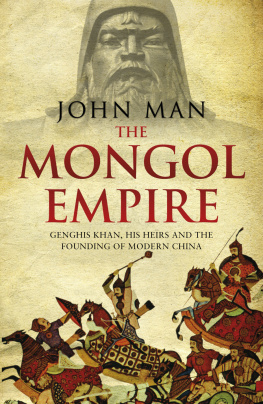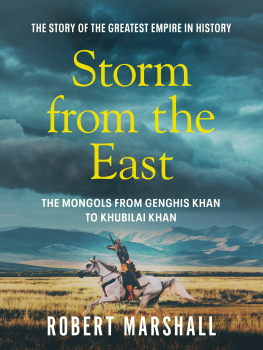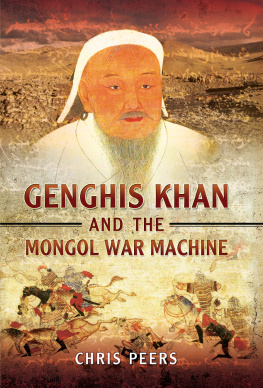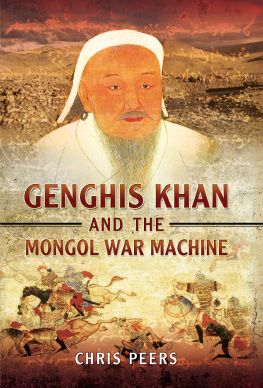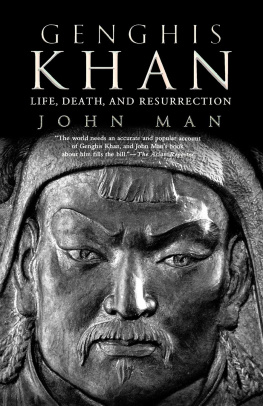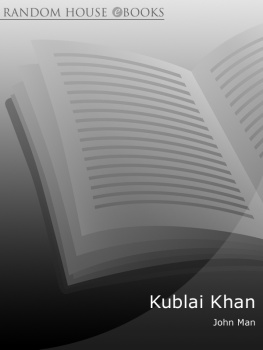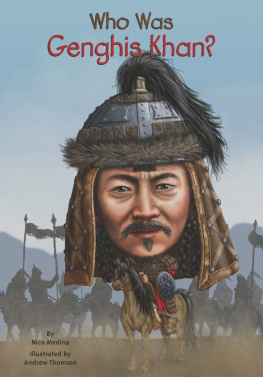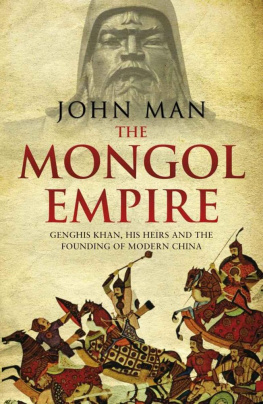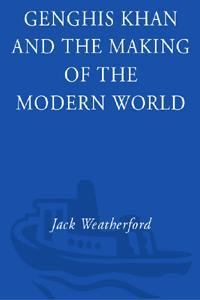CONTENTS
ABOUT THE BOOK
The Mongol Empire changed the course of history and transformed the map of the world. Driven by an inspiring vision for peaceful world rule, Genghis Khan mass-murdering barbarian to his victims, genuis and demi-god to his people united warring clans and forged an empire that spanned Asia, bringing people, cultures and religions together and opening intercontinental trade.
Under his grandson, Kublai Khan, the vision evolved into a more complex ideology, justifying further expansion. Fuelled by the belief that Heaven had given the whole world to the Mongols, Kublai doubled the empires size until, in the late thirteenth century, he and his family controlled one-sixth of the worlds land area. Along the way, he conquered China, made Beijing his capital and gave the nation the borders it has today, establishing the roots of the twenty-first century superpower.
Charting the rise and eventual fall of Genghiss Golden Family, John Mans authoritative account brings the empire vividly to life, providing essential reading for anyone with an interest in history, geopolitics, and todays complex and volatile world.
Also by John Man
Gobi
Atlas of the Year 1000
Alpha Beta
The Gutenberg Revolution
Genghis Khan
Attila
Kublai Khan
The Terracotta Army
The Great Wall
The Leadership Secrets of Genghis Khan
Xanadu
Samurai
Ninja
THE MONGOL EMPIRE
Genghis Khan, His Heirs and the Founding of Modern China
JOHN MAN
TRANSWORLD PUBLISHERS
6163 Uxbridge Road, London W5 5SA
A Random House Group Company
www.transworldbooks.co.uk
First published in Great Britain
in 2014 by Bantam Press
an imprint of Transworld Publishers
Copyright John Man 2014
John Man has asserted his right under the Copyright, Designs and Patents Act 1988 to be identified as the author of this work.
Maps by Tom Coulson, Encompass Graphics
A CIP catalogue record for this book is available from the British Library.
Version 1.0 Epub ISBN 9781448154647
ISBNs 9780593071243 (cased)
9780593071250 (tpb)
This ebook is copyright material and must not be copied, reproduced, transferred, distributed, leased, licensed or publicly performed or used in any way except as specifically permitted in writing by the publishers, as allowed under the terms and conditions under which it was purchased or as strictly permitted by applicable copyright law. Any unauthorized distribution or use of this text may be a direct infringement of the authors and publishers rights and those responsible may be liable in law accordingly.
Addresses for Random House Group Ltd companies outside the UK can be found at:
www.randomhouse.co.uk
The Random House Group Ltd Reg. No. 954009
2 4 6 8 10 9 7 5 3 1
For TW and DW-M
MAPS
ACKNOWLEDGEMENTS
With thanks to: Chris Atwood, Professor of Mongolian History, Indiana University; Charles Bawden, Emeritus Professor, and former Professor of Mongolian at the School of Oriental and African Studies, London, who started it all; Dr Dambyn Bazargur and Badraa; Siqin Brown, SOAS; Yuefan Deng, Stonybrook University, NY; Dalai, historian, Ulaanbaatar; Ruth Dunnell, Associate Professor of Asian History and Director of International Studies, Kenyon College, Gambier, Ohio; Erdenebaatar, Institute of Animal Husbandry, Ulaanbaatar; Stephen Haw, for vital guidance on Marco Polos China; Helen, Renmin University, Beijing, for wonderful interpreting; Professor Tsogt-Ochir Ishdorj, Head, Department of Historiography, History Institute, Mongolian Academy of Science; Jorigt and Nasanbayar of the Mongolian Language Institute, School of Mongolian Studies, Inner Mongolia University, Hohhot; Luc Kwanten and Lilly Chen, Big Apple-Tuttle Mori, Beijing and Shanghai; Professor Yao Dali, History Department, Fudan University, Shanghai; Lars Laaman, History Department, SOAS, for his help with Sharaldai (see ) and his translator, Geok Hoon Williams; Yuan-chu Ruby Lam, Department of Chinese, Wellesley College, MA; Du Jian Lu, Xi Xia Institute, Ningxia University; Richard John Lynn, for his Xanadu verse translations; Tom Man, of Perioli-Man, Oxford, for putting flesh on the Pleasure Dome; David Morgan, formerly Professor of History, University of Wisconsin-Madison; Nachug, Director, Institute for Genghis Khan Studies, Edsen Khoroo (Genghis Khan Mausoleum); Oyun Sanjaasuren, MP, leader of Citizens Will-Republican Party, Head of Zorig Foundation; Igor de Rachewiltz, School of Pacific and Asian Studies, Australian National University, for vital and unstinting guidance; Panoramic Journeys, together with Esee, two Nyamas, Ravi, Refika, Nancy and Joan; my Mongol guides, Goyotsetseg Reston (Goyo) and Tumen; Randall Sasaki, Texas A&M University, and Kenzo Hayashida for an introduction to Kublais lost fleet; Sainjirgal, researcher, Genghis Khan Mausoleum; Sharaldai, theologian, Genghis Khan Mausoleum; Professor Noriyuki Shiraishi, Niigata University, for his comments and guidance in Avraga; Professor Chris Tyler-Smith, formerly at the Department of Biochemistry, Oxford University, for his help on Genghiss genetic legacy; Professor Wei Jian, Renmin University, Beijing, for unique insights and inspirational guidance; William Shou for the Xanadu trip; Jack Weatherford, Macalester College, MN; Graham Taylor, Karakorum Expeditions, Ulaanbaatar; Frances Wood, British Library; Lijia Zhang, Beijing, for friendship; as always, Felicity Bryan and her team; and in Transworld Doug Young, Henry Vines and Sheila Lee.
The quotations from The Secret History are from de Rachewiltzs version (see ), with permission from Koninklijke Brill NV, Leiden, Netherlands.
A note on spelling
In transliterating Chinese, pinyin is now standard, but it still overlaps the old WadeGiles system. I use whichever seems more appropriate. Spellings of personal names vary widely. Genghis is pronounced Chingis in Mongol, and should really be spelled like that in English (to overcome a common fault: the G is soft, as in George, not hard, as in good). I retain Genghis out of deference to tradition. I use the more familiar Kublai rather than Khubilai, Qubilai or Kubla. Xanadu is Shangdu (Upper Capital) in Chinese; but Xanadu is traditional in English, thanks to Coleridge.
B ECOMING G ENGHIS
Blue Lake, one of Genghiss family camp-sites, is widely accepted as the spot where Genghis received his title in 1189.
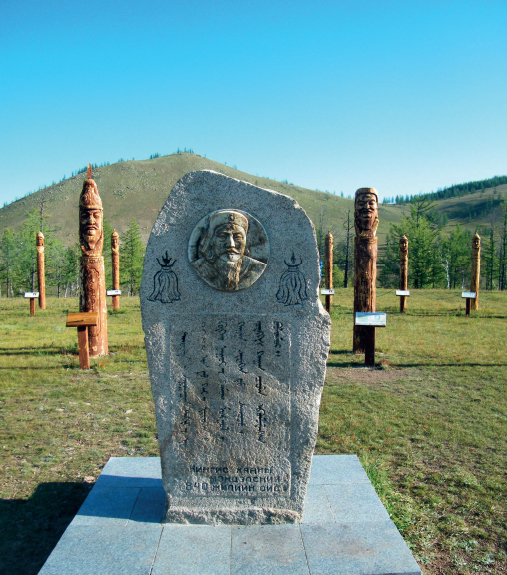
A new plaque commemorates the occasion. Seen here with Black Heart mountain behind, it is flanked by totemic portraits of later khans.
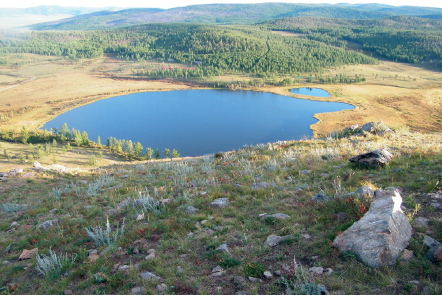
Blue Lake seen from Black Heart mountain.
All of them having agreed among themselves, they said to Temujin, We shall make you khan... If we violate your counsel, cast us out into the wilderness! In this way they swore and made Temujin khan, naming him Genghis Khan. adapted from

